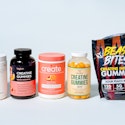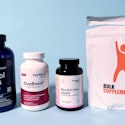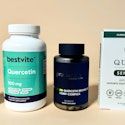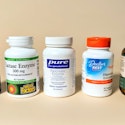FITNESS

A muscle-building stack can help gain lean mass and protect your muscles. Here are the best options.

Find out which amino acid supplements can best help you gain muscle and move longer in our 2026 guide.

Our guide details which glutamine supplement is the best for weight control, muscle recovery, and gut health.

The Best Creatine Gummies and Chews
We find the best creatine gummies and chews for taste and benefits in strength, cognition, and more.
Sermorelin Peptide: Benefits, side effects, dosage details, and how it works
Learn how the peptide sermorelin may help muscle growth, weight loss, brain health, and energy.
Best Peptides for Muscle Growth
Find the best muscle growth peptides — stacks and solo treatments — for efficacy, safety, and more.
MOTS-c Peptide: Benefits, side effects, dosage details, and how it works
We examine what the peptide MOTS-c can do for longevity, metabolism, muscle, weight loss, and more.
CJC-1295 and Ipamorelin
Learn how CJC-1295 and ipamorelin may increase muscle and cut fat, and whether they’re safe.
Here’s What Happened When I Took Innerbody Labs Testosterone Support Supplements for 12 Weeks
Find out what happened after 3 months taking Innerbody Labs Testosterone Support supplements.
Best Creatine for Muscle Growth
Our team sets out to discover if using creatine can make a real difference in your muscle growth.
Perfect Amino Review
We cover all you need to know about Perfect Amino, including its safety, efficacy, cost, and more.
Tonal vs. Speediance
We compare Tonal 2 to Speediance’s Gym Monster 2 to see which is the best fit for your home.
Chirp Wheel Reviews
Our team reviews Chirp Wheel’s back pain relief system to see if it can soothe your aches.
Best Supplements for Muscle Growth
We narrow a wide field to a few stellar supplements for muscle growth to help you excel in the gym.
Best Electrolyte Powder
We identify the electrolyte powders that are best in 2026 for hydration, taste, cost, and more.
Best HMB Supplement
It’s tricky to retain muscle, but HMB can help. Find out how, and discover your best supplement options.
Best Recovery Supplement
We break down the complex science of workout recovery to find the best supplement for your needs.
Best Lysine Supplements
Find out which of our top-rated lysine supplements could help you improve your health and wellness.
Best L-Citrulline Supplement
In our 2026 guide, discover the best L-citrulline supplements for safety, savings, and more.
Best Pea Protein Powder
Learn about the costs and benefits of the six best pea protein powder options in 2026.
Best Creatine for Women
In our expert guide, find out which creatine supplements are best for women’s weight loss and muscle recovery.
Best BCAA for Women
Find out which BCAA supplements are best for helping women lose weight without sacrificing muscle gains.
Trenorol Review: Can Trenorol deliver a more toned body?
For our reviews, we test Crazy Bulk’s Trenorol pre-workout to see if it’s as effective as Trenbolone, yet safe.
A Guide to Interval Training
Learn about this efficient training style and how it could help boost your heart health, strength, and more.
Delayed Onset Muscle Soreness (DOMS): Pain After Exercise
Still sore days after a workout? Learn about delayed onset muscle soreness (DOMS) and how you can find relief.
Mental Health Benefits of Exercise
In our expert guide, find out how exercise can boost mental health, enhancing mood and self-confidence.
Functional Fitness Training: Exercise for Everyday Life
Our guide covers functional fitness training basics, health and wellness benefits, and example exercises.
How to Fit Exercise into a Busy Daily Routine
Life gets busy. Make sure exercise fits into your routine with our tips about timing, efficiency, and simple workouts.
Physical Activity Recommendations: Best Types for Adults
27.5% of adults don’t get enough exercise. Learn about different kinds of physical activity and their benefits.
10 Easy Ways to Boost Your Metabolism
When weight loss gets hard, we’ve got 10 easy ways to boost your metabolism and get you back on track.NUTRITIONAL SUPPLEMENTS

Learn the best ways to give yourself ‘nutritional insurance’ with the top men’s multivitamins of 2026.

Find out how the best sea moss options in 2026 can help with weight loss, heart health, and more.

Our review explores whether fatty15 can help you feel, sleep, and eat better while repairing your cells.

Best Inositol Supplement
We review leading inositol supplements for metabolic health, PCOS, and fertility.
The Best Quercetin Supplement
We review the best quercetin supplements for allergies and immune balance to find what works.
The Best Greens Powders
Learn how the best greens powders compare in cost, ingredients, taste, and safety.
Best Fruit and Vegetable Supplements
Our expert guide to the top five fruit and vegetable supplements can help you learn which is best for you.
AG1 Review: Does it live up to the hype?
Our expert review of AG1 looks at safety, cost, taste, convenience, and more. Read this before you buy!
Best Digestive Enzymes Supplement
We review digestive enzyme supplements for post-meal discomfort to help you find the right fit.
Best Beet Supplement
Discover which beet supplements can help you boost energy, improve stamina, and enhance circulation.
The Best Astaxanthin Supplement
We test top astaxanthin supplements for recovery, skin, and eye health to find what works.
Best Multivitamin for Women
Our guide explores who can benefit from a multivitamin, how they work, and which are best for women.
The Best Potassium Supplement
Our experts review the best potassium supplements for daily needs, heart health, and electrolyte support.
Best ZMA Supplement
Discover the best ZMA supplement in terms of effectiveness, safety, cost, and more.
Grüns Review
Our review of Grüns Super Greens Gummies details their safety, efficacy, cost, taste, and more.
Innerbody Coupon Codes and Discounts
Innerbody Labs offers subscription discounts and exclusive coupon codes to save you extra money.
How Are Supplements Made?
A formulation expert describes the development process behind the making of nutritional supplements.
Best Vitamin D3 and K2 Supplements
Whether for brain, bones, mood, or overall health, these are 2026's top vitamin D3 and K2 supplements.
How to Understand a Supplement Label
A pro formula consultant breaks down how to understand the nuances of nutritional supplement labels.
4 Tips (and a Warning) When Choosing a Supplement Company
We’ll help you decide whether or not a supplement company is worth your time and money.
Best Kids Vitamins
Are vitamins right for your child? Our guide covers who they're for, how they work, and the best options.
Best Fish Oil Supplement
We examine the pros, cons, costs, and details of the 7 best fish oil supplements of 2026.
First Day Vitamins Review
Are First Day products worth it for your family? Our review covers safety, cost, taste, and more.
7 Things to Look for When Choosing a Supplement
These seven criteria can guide you toward choosing a nutritional supplement that might actually work for you.
Hiya Vitamins Reviews
Are Hiya’s vitamins right for your family? Here are our reviews of their efficacy, safety, cost, and taste.
Primal Greens vs. AG1
When it comes to cost, ingredients, taste, and more, AG1 vs. Primal Greens is a duel. Find out which greens powder is better for you.
HUM Nutrition Reviews: Pros, cons, and alternatives
Our expert review can help you decide if HUM Nutrition offers the ideal supplements for your health needs.
Ka'Chava Reviews
Our testing team tried Ka’Chava to deliver our reviews on this blend of protein and superfoods.
Onnit Total Human Review
Our expert review of Onnit Total Human supplements covers ingredients, efficacy, cost, and safety.
Life Extension Review: Everything you need to know
Are the products from Life Extension legit? Our expert review tells you everything you need to know.
Best Krill Oil Supplements
Is it time to replace your daily fish oil supplement with krill oil? Explore the best supplements with us.
Best Green Tea Extract
Learn about the potency, prices, and benefits of green tea extract with our top five picks in 2026.
Balance of Nature Review and Alternatives: What to use as a replacement
We’ve tried Balance of Nature ourselves and done tons of research. Here are the products we’d recommend instead.
Huel vs Soylent: Which company makes the best meal replacements?
Our experts explore a meal replacement rivalry – Huel vs Soylent – to see which one reigns supreme.
Puritan’s Pride Review: Quality Supplements at a Low Price?
Our expert review of Puritan’s Pride examines the pros and cons of this vitamin and supplement brand.
Huel Review
Our team of experts tries Huel meal replacements to see how they taste and if they can fill you up.
Dr. Gundry Review: All about Dr. Gundry’s diet advice and supplements
Find out which superfoods Dr. Gundry suggests eating in 2026 to maintain a lectin-free diet.
XtendLife Review: Your choice for health supplements and skincare?
Our XtendLife supplements review tells you all the details about cost, quality, convenience, shipping and more.
Ritual Vitamins Review
Our Ritual vitamins review shares all the details about these multivitamins — quality, pricing, discounts and more.
Orgain Reviews: A good value in supplements and meal replacements?
Are Orgain’s protein powders and meal replacements a cut above the competition? Our reviews share all the details.HEALTHY WEIGHT

Our DoFasting reviews help you decide whether the fasting app and supplements will help you lose weight.

Our testing team orders and tries Henry Meds semaglutide to review the experience from start to finish.

Or maybe better: semaglutide vs. tirzepatide? Here are the facts about Wegovy and Mounjaro.

Best Peptides for Weight Loss
We analyze the best peptides for weight loss in terms of their effectiveness, safety, and availability.
Tesamorelin Peptide: Benefits, side effects, dosage details, and how it works
Learn how the injectable peptide tesamorelin can improve visceral fat, muscle mass, brain function, and more.
Lumen Review
In our Lumen review, we present the findings from our research and testing to see whether this metabolism tracker can aid in weight loss.
Eating Disorders
Read our guide to discover eating disorder causes, symptoms, resources, and treatment options.
Reverse Health Reviews
Our team reviews Reverse Health, a weight loss and fitness app geared toward menopausal wellness.
Understanding Calories
Learn about calories and kilocalories, how we measure the energy that foods and liquids provide our bodies. And explore how our bodies use that energy.
Best 3 Day Cleanse: Comparing the top detox cleanses
In our expert guide, find out which 3 day cleanse will be best for detoxing, weight loss, and regularity.
Found Weight Loss Reviews
If you’re trying to lose weight and keep it off, check out our reviews of Found’s weight loss program.
Achieving and Maintaining a Healthy Weight
A registered dietitian explains the fundamentals of losing weight and maintaining ideal weight for optimal health.
What Determines What We Eat
As part of a study of nutrition, examine the major factors that shape our food choices — culture, cost, health and more.PRE- & PROBIOTICS

We fully explore Bio Complete 3 in our review. Find out if it aids in digestion and weight management.

Feeling tired while on a keto diet? MCT Wellness might be the solution. Find out in our reviews.

Learn about the five best supplements that might support, cushion, and fortify your leaky gut.

Bio X4 Reviews: Will it lead to weight loss or a healthier gut?
Find out if Bio X4 is high-quality and effective for your gut health (and waistline) in our 2026 reviews.
Best Butyrate Supplement
Based on our testing and research, these are the best butyrate supplements to improve your gut health.
Seed Probiotic Reviews
With its unique probiotic strains, Seed aims to improve your health. Our review explores it all.
Multi-GI 5 Reviews: The right probiotic blend for you?
Our expert reviews of Multi GI 5’s ingredients, cost, and safety help you decide if it’s right for you in 2022.
Counting on a Colon Cleanser? Here are 5 Better Choices
Find out which colon cleansers best stimulate bowel movements and promote regularity.
Vital Reds Review
In our review, find out if Vital Reds’ polyphenol blend boosts energy, burns fat, and helps digestion.
Total Restore Reviews: Will it improve your gut health?
Our Total Restore reviews tell you whether this supplement can improve your gut health and gut lining.
What Can Prebiotics and Probiotics Do For Your Health?
Learn what prebiotics, probiotics, and the trillions of good bacteria in your gut do to improve your health.FITNESS & DIET RESOURCES

Eating organic and growing your own food can benefit your health and the environment. We’ll help you get started.

An in-depth collection of vital facts and statistics about food allergies and those who suffer from them.

Evidence suggests that coffee can help improve your health! Here are the top 10 health benefits.

Beginner’s Guide to Peptide Therapy
Learn what peptides are, what they can do, and everything else you need to know about peptide therapy.
BPC-157 Peptide
Our 2026 guide to BPC-157 peptide therapy investigates its efficacy, safety, potential benefits, and more.
Nourish Reviews
In our Nourish review, we explain how the dietitian telemed platform works, how much it costs, and whether it could work for you.
How I Ran a Sub-3-Hour Marathon While Maintaining Muscle
An author turned hybrid athlete shares how to balance endurance, strength, and recovery.
Macronutrients
Learn all about the nutritional importance of proteins, fats and carbohydrates in our diet, and explore how our bodies use these macronutrients.
Micronutrients
Your guide to the essential water-soluble and fat-soluble vitamins, as well as the trace and major minerals in our diet — collectively, the micronutrients.
Nutrition for Healthy Teeth
We delve into essential nutrients for dental health, the effects of snacking, and special considerations for children.
Could your diet be causing hair loss?
Is your hair loss due to your diet? We spoke with experts on how nutrition can affect your hair health.
Lowering Salt in Your Diet
Learn about different types of salt, how much is too much, and ways you can reduce your intake.
Calcium: Benefits and Sources
Our guide discusses what calcium is, what it does for you, the best sources, and how much you really need.
How Much Water Should You Drink?
Proper hydration is essential. Learn about how much water you need along with common signs of dehydration.
How Much Protein Do You Need?
Find out what protein does for your body, where it can be found, and how much you need to consume.
Healthy Eating for Older Adults
Our guide to healthy eating for older adults explores how to select foods as your nutrient needs change.
Maintaining a Healthy Weight During Pregnancy
Our guide on healthy pregnancy weight covers guidelines, calorie needs, nutrition, exercise, and body image.
Glycemic Index for More Than 60 Common Foods
Find out whether your dietary staples are likely to cause weight loss or gain with our glycemic index chart.
The Nutritional Value of Beans: A Versatile Superfood
Pulses (beans, peas, and lentils) are superfoods linked to longevity and a lower risk of chronic disease.
The Power of Plants: Benefits of Fruits, Vegetables, and Whole Grains
For an energy-boosting and nutritious diet, add fruits, vegetables, and whole grains to your meals.
What Are the Healthiest Ways to Eat Eggs?
We’ve compiled recipes and tips about the healthiest ways to eat eggs to help you get essential nutrients.
Omega-3 Content in Seafood Products
Our team reveals the levels of omega-3 fatty acids in various seafood products so you can choose the best.
How Diet and Exercise Affect the Risk of Cancer
Learn how your diet and exercise choices affect the likelihood you’ll develop a few specific kinds of cancer.
Managing Malnutrition in Older Populations
Seniors are at especially high risk of developing malnutrition. We provide information to help you prevent it.
Pros and Cons of Frozen Food
Learn about the pros, cons, health benefits, and preparation of frozen food, meals, and produce.
What is a Mediterranean Diet?
We break down the widely recommended Mediterranean diet and explain why it’s so famously healthy.
10 Mighty Foods to Boost Your Heart Health
Changing your diet can alter your risk of heart disease, and these 10 foods may boost your heart health most.
Ideas for a Healthy and Creative Breakfast
We gathered facts and recipes to help you bolster your energy through healthy and creative breakfast ideas.
Bone Broth Benefits
Discover the many benefits of bone broth, including better sleep, boosted energy, and improved weight management.
What does the average American diet look like?
Do American perceptions of eating habits match national guidelines? We surveyed 850 people to find out.
Health Benefits of Vegan Diets
Find out 45 benefits of a vegan diet to help save the planet, your wallet, and your health in this guide.
Vitamin D Deficiency and How to Avoid It
Find out how to get enough vitamin D to boost immunity, enhance bone health, and improve overall wellness.
Flavonoids: Are there significant health benefits to drinking black and green tea?
Find out whether the flavonoids in green and black teas make them a healthy choice for your heart and in general.
Water: It's More Than Just a Drink
Learn all about water from a nutritional standpoint. Explore its role in the body, the importance of fluid and electrolyte balance, and how to maintain proper hydration.








